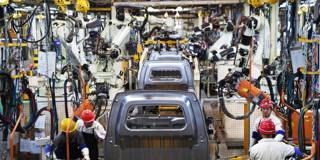Although the factors contributing to stagnant productivity are well known, economists and policymakers have so far paid little attention to figuring out how to address these problems in a coordinated way. But the need to deliver broad-based prosperity is more pressing than ever, and this shortcoming must be rectified without delay.
CAMBRIDGE – In a 1996 lecture entitled “Big Bills Left on the Sidewalk,” the late Mancur Olson made a powerful observation: an individual from a poor country – say, Haiti – who migrates to a richer country like the United States immediately becomes vastly more productive and earns a far higher wage than before. The individual has not changed overnight, so their skills or cultural attitudes cannot explain their improved situation. The answer must instead lie in their new country’s environment.
Olson therefore concluded that many (or most) economies are not socially efficient. A better institutional and social context, and higher stocks of assets from past investments, can make an enormous difference to individuals’ productivity, and hence to their living standards.
The challenge, as Olson pointed out, is that individuals cannot change the overall context in which they live and work, except by moving elsewhere. The improvements needed to raise an entire economy’s productivity require coordinated, collective action. Olson’s own well-known research on the logic of collective action explored why this is so difficult to achieve.

CAMBRIDGE – In a 1996 lecture entitled “Big Bills Left on the Sidewalk,” the late Mancur Olson made a powerful observation: an individual from a poor country – say, Haiti – who migrates to a richer country like the United States immediately becomes vastly more productive and earns a far higher wage than before. The individual has not changed overnight, so their skills or cultural attitudes cannot explain their improved situation. The answer must instead lie in their new country’s environment.
Olson therefore concluded that many (or most) economies are not socially efficient. A better institutional and social context, and higher stocks of assets from past investments, can make an enormous difference to individuals’ productivity, and hence to their living standards.
The challenge, as Olson pointed out, is that individuals cannot change the overall context in which they live and work, except by moving elsewhere. The improvements needed to raise an entire economy’s productivity require coordinated, collective action. Olson’s own well-known research on the logic of collective action explored why this is so difficult to achieve.